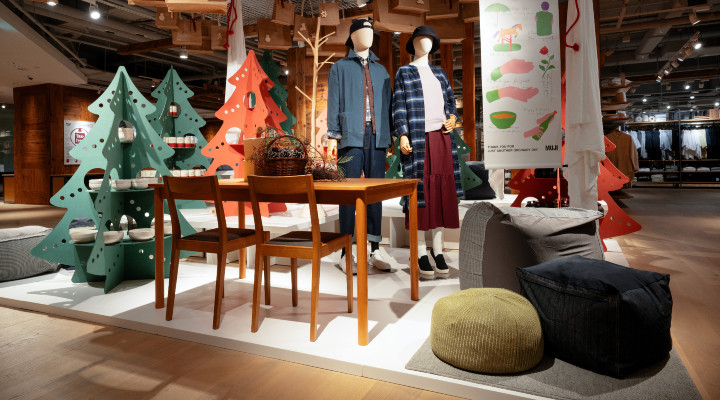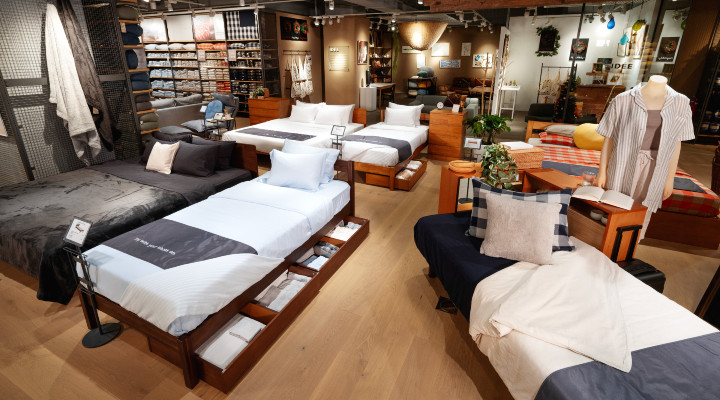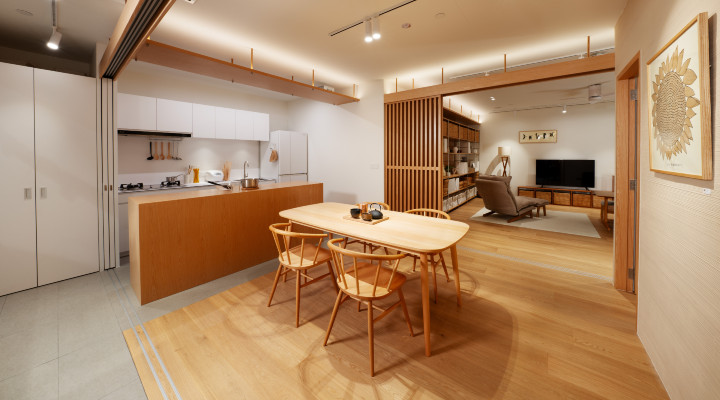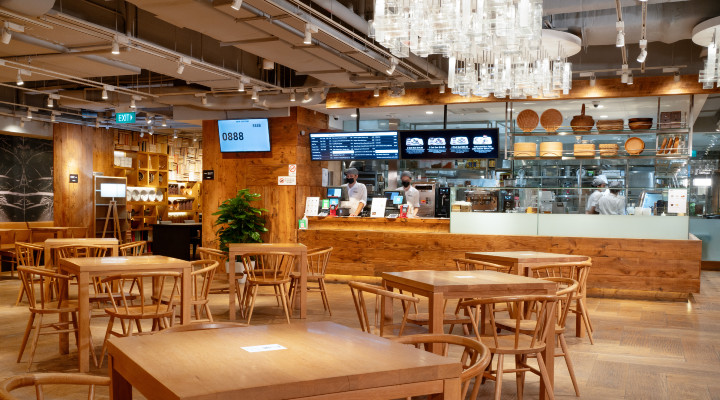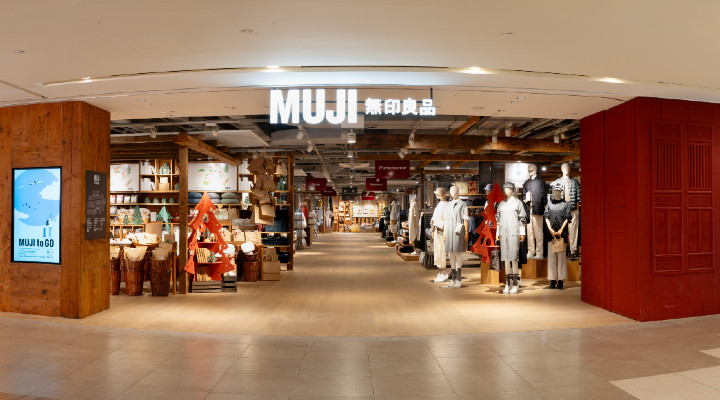Japanese retailer Muji unveiled its largest flagship store in Southeast Asia, with the recent reopening of Muji Plaza Singapura in the heart of Singapore, following a transformative makeover. The 38,000 sqft space underwent a substantial expansion, more than doubling in size, and now boasts a diverse array of offerings across 15 departments, encompassing over 3,000 products. But it’s not just about size; Muji Plaza Singapura has introduced innovative concepts that redefine the shoppi
shopping experience.
Among these are ‘Muji Renovation,’ a one-stop destination for comprehensive home planning, from renovation to furnishing, and ‘Everyday Good Price,’ a collection of sustainable living essentials, all priced below $10.
In a bid to cater to a wider audience, ‘Muji Fashion’ has broadened its horizons, unveiling exclusive offerings that encompass everything from maternity wear to kids’ and babies’ innerwear and sleepwear.
Even ‘Cafe&Meal Muji’ has joined in on the expansion, now comfortably accommodating up to 94 diners with a festive menu available until December 27.
Furthermore, Muji Plaza Singapura has introduced a frozen food section and solidified its community market as a permanent fixture. This market proudly showcases products hailing from lesser-known Japanese regions, further enriching the shopping experience.
The story so far
According to Katsushi Onishi, Muji Singapore’s managing director, the team hopes that with the expanded space available, products can be displayed in an ‘easy-to-see and understandable manner’.
“We have carefully considered both regional and local perspectives, to make sure it is a space that sells both global daily necessities, while responding to the needs of local and Japanese-oriented customers. We hope anyone who visits will think that ‘Singapore’s Muji is the best in the world!’,” he told Inside Retail.
On the topic of ‘Muji Renovation’, Onishi said that the Singapore market has a uniquely high rate of home ownership at approximately 90 per cent, which is why the brand wanted to provide an end-to-end transformation space for homeowners.
“They will now have the chance to build a home that is truly Muji, and not one that is merely ‘Muji-inspired’. This comprehensive and tailored service helps customers to build homes adaptable to their lifestyle, and any future needs and priorities,” he added.
He went on to say that the section will feature whole-home renovation from start to finish, designed with Muji’s unique concept, constructed with customised carpentry works built from scratch, and furnished with Muji furniture and storage items.
“Customers can visit our 1,045sqft showflat, located at the back of the store, that showcases our new Muji Renovation service, and discover our vision – simple, natural and with high-quality products,” he noted.
Why Singapore
Onishi acknowledged that Singapore is well-known as a regional tech and innovation hub, so it was only natural for Singapore to take the lead in Southeast Asia.
“With the largest flagship store in Singapore, we are able to showcase the latest concepts from Muji Japan stores to Singaporeans and overseas visitors, acting as a window to the world of Muji,” he elaborated.
He hopes to use this store to share more about the brand’s philosophy with the general community.
“Although it has been 20 years since our establishment in Singapore, we believe this flagship store serves as a milestone towards building our future business, both in Singapore and Southeast Asia,” he explained.
Despite land scarcity, he said that Singapore takes the lead in ASEAN countries in terms of purchasing power and standard of living – so this is the ideal spot to serve as a test bed for all new endeavours and challenges.
“We’re grateful for the opportunity to expand our offerings at Muji Plaza Singapura. Using this store as a base, we hope to open larger stores of sizes ranging from 14,000 to 18,000 square feet, while also expanding existing stores,” he said.
The brand also aims to expand its product availability beyond Muji stores. For example, at university campuses, selected Muji items are available at NUS Co-op.
Onishi also said that the brand may partner with more online platforms to allow easier access to its daily essentials and food items in the future.
The future
“We aim to open 100 stores across ASEAN. We are expecting to reach 20 stores in Singapore in three to five years, subject to conditions.We are not only selling retail products – but providing solutions to your life’s everyday needs,” he stressed.
He said that Muji discourages excessive consumption and promotes a lifestyle of ‘just enough’.
He hopes customers will explore their creativity when using Muji products. He reiterated that the brand will continue to contribute to a better society while staying true to its philosophy.
“Rather than just a retail store, we want to form a community where we can introduce the cross-culture between Japan and Singapore, and the various advancements in Singapore,” he added.
Onishi said the brand will continue to collaborate with companies in Singapore, as well as schools and libraries. For example, the brand previously invited the NUS Sado Club to share more about Japanese tea ceremony culture.
“Today, we live in a world where you can shop for anything on your mobile. More and more people are now thinking that something is missing. You may discover what is ‘missing’ at Muji,” he opined.
He thinks that this is the type of retail industry that will be needed in the future, and although it cannot be expressed in words, it will be possible to experience it in a brick-and-mortar store.
The bigger picture
Looking back during the pandemic, Onishi remembered how the supply chain was greatly disrupted. As a result, Muji in each country began developing their own products with local producers who resonate with the brand’s product development concept.
“We saw opportunity in the crisis and since then, have been working across ASEAN to develop products with regional characteristics that cannot be supplemented by common global products. For example, summer garment collection and selected furniture items that suit local climates,” he elaborated.
Although there were some challenges, the brand has received great responses to products that catered to the Malay community in Singapore.
“One lesson we learnt is about how important it is to be rooted in the local community. Technological progression is also essential for a company’s growth. Hence, we would like to speed up the implementation of technology at our retail stores to provide greater convenience to our customers and efficiency in our operation flow,” he concluded.

